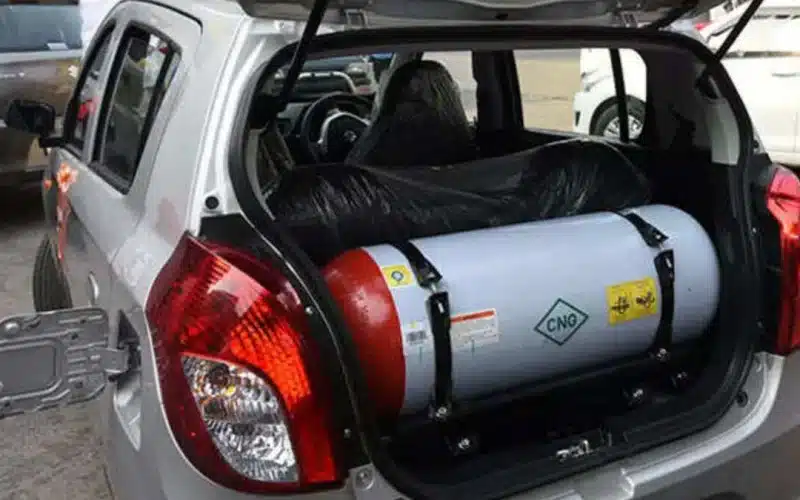With petrol rates at ₦1,150 per liter and diesel at ₦1,400 per liter, it’s no surprise that Nigerians are seeking cheaper ways to fuel their vehicles. CNG offers a cost-effective alternative to traditional fuels, with prices ranging from ₦180 to ₦200 per standard cubic meter. With growing gasoline costs, more individuals are exploring alternate energy choices, including converting vehicles to Compressed Natural Gas (CNG).
Converting your gasoline or diesel vehicle to run on compressed natural gas appears to be a lifeline. But, before you dive in, consider the benefits and drawbacks, prices, and what it genuinely means to make the transition in Nigeria’s current situation.
Why Convert Your Petrol or Diesel Vehicle to CNG?
Before we get into the details, let me address the obvious: why should you consider converting your petrol or diesel-powered vehicle to CNG? The most compelling rationale is substantial cost reductions. With gas costs around ₦600 per liter (as of 2024), fueling your vehicle can take a significant portion of your salary. CNG is more affordable, costing approximately ₦160 per standard cubic meter.
Another plus: Nigeria has one of Africa’s largest natural gas deposits, making CNG not only less expensive but also more locally sourced. This means you’re boosting the economy while saving money. Sounds like a win-win situation, right?
However, it is not only about the expense.
CNG is also regarded as a cleaner fuel. When burned, it emits fewer pollutants, such as nitrogen oxides and particulate matter, making it a more environmentally friendly alternative. In today’s world, where climate change is a major concern, lowering your carbon footprint isn’t just responsible; it’s becoming imperative.
What Does the Conversion Process Involve?
Installing a CNG conversion kit is required to convert your petrol or diesel-powered vehicle to run on compressed natural gas. This package contains a CNG tank for storing the gas.
- A pressure regulator.
- Carburetor or injectors
- Fuel lines with high-pressure
- Control modules.
The process often takes a day or two, but don’t get too excited—conversion isn’t cheap. Vehicle prices range from ₦300,000 to ₦600,000, depending on model and kind. However, many drivers say that the savings in fuel prices enable them to recoup their initial investment in just a few months.
It’s also worth noting that not all automobiles are suitable for CNG conversion. Older carburetor versions may have a more difficult time adapting to the CNG system than newer fuel-injection types. A fast consultation with a licensed CNG conversion expert will help you establish whether your vehicle is eligible for conversion.
How Safe is CNG?
This is likely one of the most often requested questions. The good news is that CNG is typically regarded as a safe fuel alternative. CNG tanks are extremely sturdy, engineered to handle high pressures, and significantly less likely to break than standard fuel tanks. In the event of a leak, CNG disperses fast into the air since it is lighter than air, lowering the risk of igniting when compared to petrol or diesel spills, which tend to pool.
However, as with any gasoline system, frequent maintenance is required. You should check for leaks regularly and get your CNG system serviced by a trained expert. Nigeria is also slowly but steadily catching up on safety rules, with more approved CNG conversion centers opening throughout the country.
Advantages of CNG Conversion in Nigeria
Switching from gasoline or diesel to compressed natural gas (CNG) can provide various advantages, particularly with growing fuel costs. Here’s why CNG conversion could be a good idea in Nigeria:
#1. Fuel Savings
CNG offers huge savings compared to petrol and diesel, which cost ₦1,150 and ₦1,400 per liter, respectively. CNG costs approximately ₦180 to ₦200 per standard cubic meter and can significantly cut gasoline bills. The savings on fuel over time can easily offset the cost of conversion.
#2: Environmental Benefits
CNG burns cleaner than gasoline or diesel, resulting in less hazardous pollutants. Converting to CNG reduces your carbon footprint, helping to make Nigeria’s environment greener and healthier. This is especially important in urban areas, where air quality is a major concern.
#3: Extended Engine Life
CNG is less corrosive than petrol and diesel, hence, CNG engines last longer. Cleaner combustion reduces wear and tear on engine components, requiring fewer repairs and maintenance.
#4: Government Incentives
The Nigerian government is aggressively encouraging CNG as part of its National Gas Expansion Program (NGEP), thus, vehicle owners who want to convert may be eligible for cash incentives or subsidies. These incentives may further reduce the cost of conversion.
#5: Energy Security
Nigeria has vast natural gas reserves, making CNG a more sustainable and reliable fuel source than petrol and diesel, which are vulnerable to worldwide price swings. By using CNG, you become less dependent on the uncertain international oil market and more connected to local energy resources.
#6. Enhanced Availability of CNG Stations
CNG filling stations are becoming more frequent in Nigeria, even if they are still in their early stages. Cities such as Lagos, Abuja, and Port Harcourt are opening more stations, making it easier to refill CNG-powered automobiles. Access will only improve as the infrastructure develops.
These benefits make changing to CNG a forward-thinking alternative for both individual car owners and fleet operators in Nigeria, particularly given the current economic climate and growing fuel costs.
What are the disadvantages?
While converting to CNG in Nigeria provides significant cost savings and environmental benefits, it is critical to consider the potential drawbacks before making the switch.
#1. Limited Availability of Refueling Stations
The scarcity of CNG refueling stations in Nigeria is one of the most significant barriers to its adoption. Although cities such as Lagos, Abuja, and Port Harcourt are seeing a boom of CNG stations, most other states are trailing behind. If you routinely travel outside of big cities, you may struggle to find a CNG refueling station, leaving you stuck. Planning itineraries based on station availability becomes critical, and for others, it is a dealbreaker. The uneven distribution of CNG infrastructure remains a significant hurdle to widespread adoption.
#2. Concerns Over Storage Space
CNG tanks are much larger than standard fuel tanks and are often mounted in your vehicle’s trunk or rear cargo compartment. This can significantly diminish your vehicle’s available storage space. If you routinely transport bags, food, or work-related items, this could be a significant annoyance. The size of the tank may limit your capacity to haul heavier objects or travel long distances with heavy luggage.
#3. Costs of Installation and Maintenance
Converting a car to run on CNG is not inexpensive. While it may result in long-term savings, the initial installation costs can be high. Conversion costs typically range from ₦200,000 to ₦500,000, based on vehicle type and installation complexity. You should also consider the cost of maintenance, as CNG systems require frequent tests and can be expensive to fix if they malfunction. Because not all mechanics are trained to work on CNG systems, you may need to visit specialized service shops, which may be inconvenient depending on your location.
#4. Reduced Power Output
CNG-powered vehicles provide slightly less power than petrol or diesel-powered engines. While this may not be a problem for city driving or low loads, it may become obvious when driving on highways, ascending steep terrain, or transporting large goods. This loss in performance may not appeal to people who rely on their vehicles for difficult activities like long-distance haulage or high-speed driving. Though developments in CNG technology have narrowed the difference, it remains something to consider.
#5. Initial Conversion Time and Adjustments
Converting your vehicle to CNG is not a quick procedure. Installation could take several days, depending on the type of car and the system’s sophistication. During this time, your vehicle will be out of commission. Furthermore, following the conversion, drivers may require time to adjust to the new driving experience, particularly the change in acceleration and vehicle handling caused by the altered weight distribution.
#6. Potential Safety Concerns
While CNG is generally regarded as safe, incorrect installation or low-quality tanks may pose problems. CNG is stored under high pressure; thus, any leaks or malfunctions could result in a disastrous situation. Make sure that qualified professionals are performing your conversion using top-notch materials to reduce these risks. Regular inspections and maintenance checks are required to guarantee that the system remains safe.
How Does CNG Affect Maintenance?
Switching to CNG impacts not just your fuelling habits, but also your vehicle’s maintenance requirements. For example, vehicles that run on CNG have longer oil change intervals because CNG burns cleaner than gasoline or diesel, resulting in less carbon buildup in the engine. However, to avoid leaks or pressure regulator concerns, the CNG system must be serviced regularly.
Spark plugs and air filters also live longer, but you must inspect them more regularly than with a typical fuel engine since CNG burns at a greater temperature.
How Much Can You Save Using CNG?
This is the million-naira question, and the answer is dependent on how much you drive. On average, CNG costs 60–70% less than gasoline or diesel, thus, the more miles you drive, the more you save. Let’s break it down into some rough statistics.
- Fuel Cost per km (Petrol): ₦100 per km – Fuel Cost per km (CNG): ₦20 per km.
Driving 1,000 miles per month can save you up to ₦60,000 in gasoline expenditures alone. Over a year, this amounts to approximately ₦720,000. So, while the initial conversion cost may appear costly, you’ll repay it quickly, especially if you drive frequently.
Key Takeaways
- Switching to CNG can save your fuel costs by 60–70%.
- CNG is cleaner than gasoline and diesel, generating fewer pollutants.
- CNG tanks are more durable and less likely to ignite than gasoline or diesel spills.
- CNG filling stations are primarily concentrated in cities, so plan your journeys carefully.
- Although the initial cost of conversion is substantial, long-term benefits can compensate.
Conclusion
Converting your petrol or diesel-powered vehicle to CNG in Nigeria is an excellent alternative for individuals wishing to save money on gasoline while also reducing environmental impact. However, it is critical to assess the positives and cons, particularly the availability of refueling stations and the initial conversion cost. With fuel prices rising, more Nigerians are looking to CNG as a viable alternative. Would you consider switching to CNG, and if so, what is your greatest concern?
- How to Start Filling Station Business In Nigeria 2024
- Top 10 Best Cars for Uber in Nigeria 2024: A Comprehensive Guide
- UBER REQUIREMENTS: Uber Drivers Requirements
- HOW TO BECOME AN UBER DRIVER: Easy Way to Become an Uber Driver in 2024
- Top 10 In-Demand High-Paying Tech Skills to Learn in Nigeria 2024






